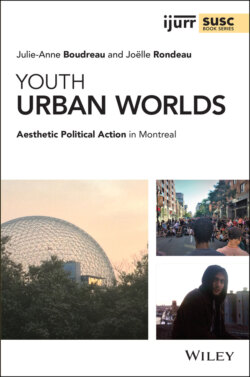Читать книгу Youth Urban Worlds - Julie-Anne Boudreau - Страница 15
The Global Urban Political Moment of the 2010s: Youthfulness in Action
ОглавлениеMuch has been written about the wave of urban political mobilizations that has swept cities around the world since 2010. The student strike in Chile, #YoSoy132 in Mexico, the ‘Maple Spring’ in Quebec, the various Arab springs, Occupy in several cities, the 15M Indignados in Spain, the Gezi movement in Turkey, the Umbrella Revolution in Hong Kong, Black Lives Matter in North America, Femen in Eastern Europe and then across the world, les Nuits debout in France following the 2015 terrorist attacks, Anonymous, the list goes on… These movements refer to one another. They are globally connected, but fundamentally anchored locally. They are mostly enacted by young people.
Why do they deploy their action in cities? Political economists would respond that urbanization creates increased inequality and injustice (Harvey 2008). Sociologists would insist that cities provide multiple public spaces that facilitate the expression of political opinions and mobilization. Environmentalists might highlight the fact that urbanization and development have produced globally shared problems that are more acutely felt in cities. While these various explanations are all relevant, they do not see youthfulness as a relevant factor, because their focus is not on the changing political form of these mobilizations.
Global urbanization creates very dense connections, from the Internet to mobile activists, from world forums to shared values and discursive resources (the right to the city, the struggle against neoliberalism). In other words, urbanization brings a more networked relation to space, and this enables political events to resonate with one another translocally. This was very clear in the Occupy and Femen movements. Furthermore, worldwide urbanization favours alternative rationalities and builds on emotional intensity. For example, emotions such as rage and outrage are explicitly positioned as the genesis of the Indignados and Juventud Sin Futuro and the struggle to punish the Mexican state for the disappearance of 43 students in Ayotzinapa in the autumn of 2014.
The urban political moment of the 2010s is characterized by specific political forms emphasizing performance more than debate (aesthetics more than representation), embodied and affective gestures, distributive agency, networked spaces of action, open‐ended politics of doing (more than a politics of claiming), and individual transformation and spirituality. In many ways, this is very similar to the urban political moment of the 1960s (see in this regard the work of Julie Stephens (1998) on anti‐disciplinary forms of protest emerging in that decade), aside from the availability of very different technologies. As Austin (2013, p. 16) vividly reminds us while analysing the 1960s: ‘People did not simply imitate or react to international struggles that they witnessed via the media. For many, events around the world highlighted their own local injustices. Inspired by what they witnessed, they experienced a kind of kinetic connection and a common sense of purpose, or what George Katsiaficas (1987) refers to as the eros effect – “the massive awakening of the instinctual human need for justice and for freedom” – which could otherwise be described as an almost spiritual sensation that connected dissidents across the globe.’ And these dissidents were and are mostly young and urban.
Indeed, around the world, there has been a rapid increase in the number of educated youths living in cities (UNFPA 2014). This generation of urban youth has developed a collective identity through the sharing of images and ideas in physical and digital spaces. Generational sociologists speak of the ‘global generation’ (Edmunds and Turner 2005).11 In Quebec, this is often called a génération d’enfants‐rois (a generation of kid‐kings). A viral Facebook post in April 2015 discusses this appellation:
While the rest of society is resigned, she wants a better world … they wonder why she doesn’t vote. They wonder why she feels the urge to break everything … Somewhere, she has a banner on which it is written: ‘Fuck toute!’ They don’t understand. They find this generation of king‐children so stupid. Fuck‐everything.12 our ethnographies of Montreal that the complexi (Sebastien Jean, 9 April 2015)
In its apparent destructiveness, the banner ‘Fuck toute!’ (fuck everything) became very present during the spring 2015 mobilizations against austerity measures in Quebec (see Figure I.2). It seems even that these youngsters were marching out of indifference, which is an oxymoron: doing and being indifferent (Collectif Débrayage 2016). To us, the exasperation expressed by the banner, intertwining virtual posts with physical graffiti and marches in the city, represents a generational rupture in the way young people practice and understand politics. This is what this book describes through four ethnographies.
FIGURE I.2 ‘Fuck toute’, Beaubien metro station, February 2016.
Source: photo by Joëlle Rondeau.
Inspired by the work of Mannheim (1952), generational sociologists argue that to be qualified as a generation, a cohort needs to share a distinctive social consciousness. Whether a generation succeeds in developing such consciousness depends, according to Mannheim, on the ‘tempo of social change’. In times of accelerated social change, youth are less reliant on the older generation’s memories (Pilcher 1994). The ‘fuck everything’ wired generation operates prefiguratively, developing new political forms, following an urban logic of action. Indeed, ‘taking young people seriously’, as Skelton (2010, p. 145) argues, ‘may well lead to new definitions of the political and demonstrate other ways of conceptualizing geopolitics and political geographies’. In the following chapters, as we immerse ourselves in various urban worlds, we will show how ‘millennials’ engage in a politics of social transformation based on digital and social media, but also – and mostly – on the sensuousness of the street. Rather than analysing these forms of youth transgressions and politics as mere deviance or countercultural excess, we see in these youth urban worlds the stuff of urban change.
